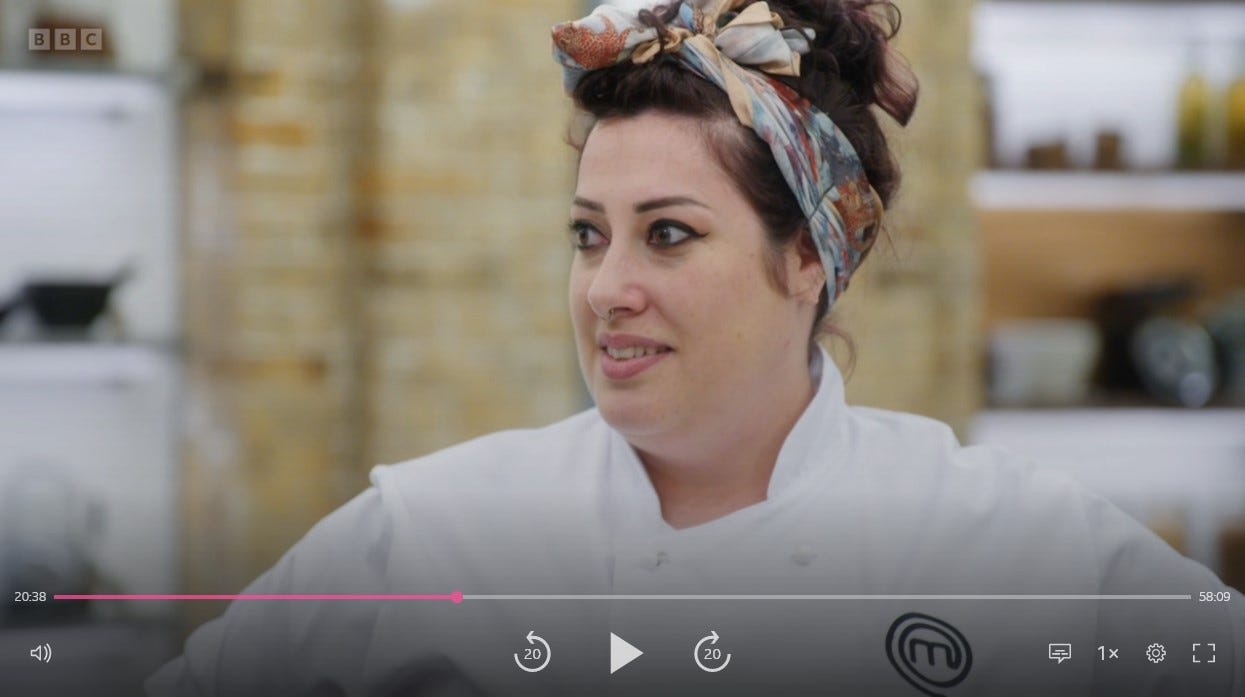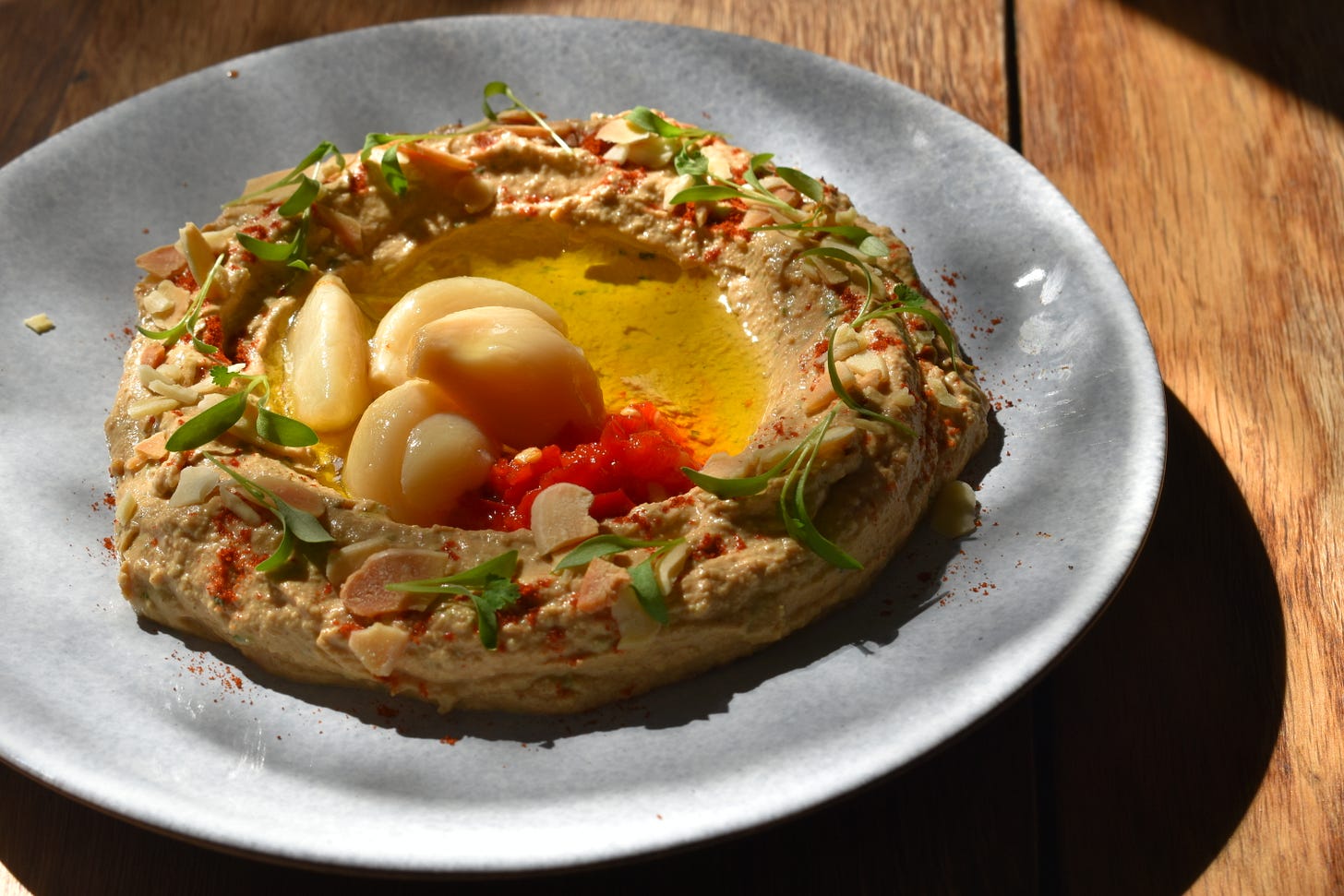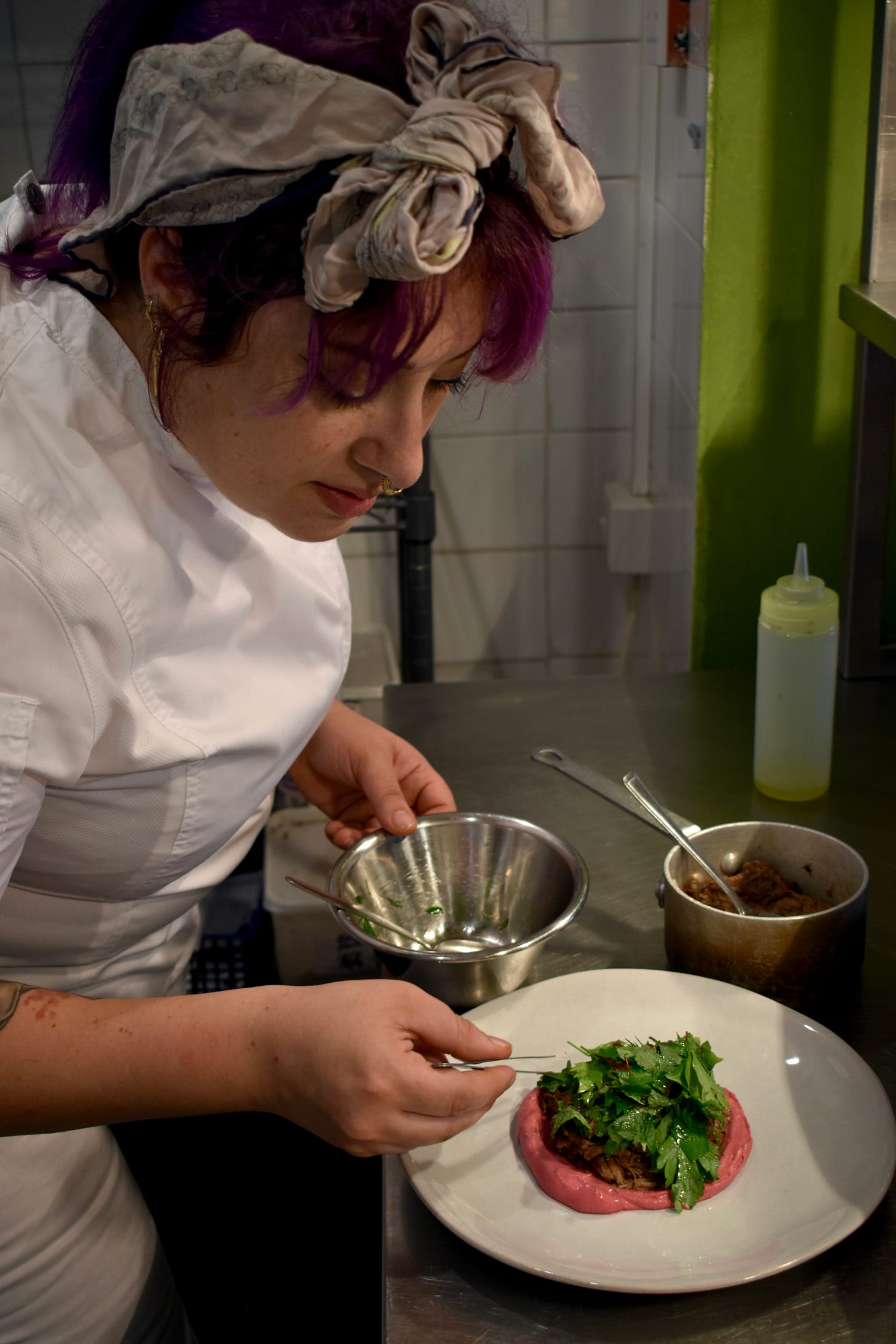Queen of the Queen of Cups [WFJ #90]
The 'half-Arab chef with purple hair' bringing not-how-you-imagined-it Middle Eastern food to Somerset
If you happened to be watching Monday’s episode of MasterChef this week, there was one contestant, I think it’s fair to say, you’d notice as standing out from the rest.
Standing out because of her purple hair and Jordanian background, yes, but also because of her cooking: Firstly, a Middle Eastern riff on risotto, which judge Marcus Wareing described as “absolutely sensational”. Thereafter, a semolina cake with Somerset cider brandy sugar syrup, causing Wareing to fall over his words before declaring the dish “full of magic”.

For two and a half years, and out of her pub/restaurant Queen of Cups, Ayesha Kalaji has been bringing this decidedly untraditional take on traditional Middle Eastern cuisine to Glastonbury. “I do still think there's this misconception that Middle Eastern food has to be kebab and falafel,” she tells the WFJ. “But it's so much more than that.”
From her menu at Queen of Cups, it becomes more apparent what she means – sure, there’s laverbread falafel (as the daughter of a Jordanian brought up in North Wales is wont to invent), but also a Somerset-inspired fattoush, and a pine nut kibbeh with fig, braised beef, and beetroot feta cream.
As well as her ongoing pursuit of rediscovering her heritage, Ayesha’s food is influenced by her kitchen escapades in of-the-moment Middle Eastern restaurants in London, like the vegetarian cafe-restaurant Bubala, the small ‘modern kebab’ chain Le Bab, and – representing modern Jerusalem cuisine – The Palomar in Soho.
Despite no longer a regular part of London – the city some call “the most important in the world for restaurants” – Ayesha’s serendipitous arrival in Glastonbury (at least partly attributed to a savvy local business partner and a landlord who didn’t want to lease his pub out to a chain) has transpired to be, in her own words, “the best decision I’ve ever made.”
“London will always be in my heart, but this is so much more exciting and fun and community-based than anything I'd ever experienced before,” Ayesha says. “I mean, I went to the butcher's the other day and I was there for half an hour because I ended up talking to a lady about the quinces in her garden. She dropped some off [at the restaurant] later that day.”
For all the advantages London has, Ayesha’s not missed out on their counterpoints, including the ability to have one-to-one connections with the farmers and producers feeding into her restaurant. “In London, I had no relationship with any of my suppliers,” she says, adding, proudly: “Here, I can point to the fields where the cows for the beef are from.”
The newfound affection for Somerset produce has led to some tasteful cultural compositions, like in the semolina cake that sent Marcus Wareing into a stammer. At the restaurant, however, maybe this is best exhibited in Ayesha’s dish of grilled Nabulsi cheese with black lime honey – the honey being from Somerset apiaries, and the cheese a Palestinian variation of halloumi (if that’s not too reductive) from Yorkshire Dama, a dairy founded by Syrian refugee Razan Alsous. “The fact that it’s made by people who struggled,” says Ayesha, “and now they've got a successful company – their story is inspiring and I just love being able to showcase such a fantastic product from such lovely people. I haven't changed [the dish] since day one.”
While sourcing locally has become much of a preference for Queen of Cups, given its influences, and, as Ayesha says, “until someone starts growing sesame in the UK”, a lot of what stocks the kitchen’s larder is imported. When that is the case, Ayesha works with small family and socially-minded businesses to get it here, as is true of the sumac and olive oil shipped in by Shorkk in Bristol.
Not just in its sourcing, there is a degree of altruism, and an intentional one of openness, in the way Queen of Cups does things. While anything less would probably result in failure for a public-facing business in a place like Glastonbury, Ayesha wants to influence perceptions of what’s considered ‘normal’ from the inside out. “How many half-Arab female chefs are there with purple hair?” she says. “I think there needs to be more people who look like me in this industry.”
There’s more to this than herself – a point made more interesting if it can inspire, and help amount to, a more vibrant and inclusive food culture on our doorsteps. Or at least one not so much, as Ayesha says, “dominated by middle-aged white men.”
In this corner of the UK, Middle Eastern food has barely any representation. And even more rarely in any sort of honest or intelligent capacity.1 But as in her MasterChef appearance, pairing dinners showcasing local products like Pilton’s cider Cultjar’s ferments, and upcoming collaborations with restaurants outside of the county, Ayesha – this ‘half-Arab chef with purple hair’ – is well on her way in her want to, if I may borrow her words, “fly the flag for Somerset.”
Other notable exceptions include Persian chef Bita Fallah, and her supper club soon to appear on the Frome circuit





